We have now built up a quote for the day to cover the whole of the year. To find a specific day use the search box or look through the month below.
We reserve the right to change the quotes from time to time, as the mood takes us!
Posted in Quote
We have now built up a quote for the day to cover the whole of the year. To find a specific day use the search box or look through the month below.
We reserve the right to change the quotes from time to time, as the mood takes us!
08 Thursday Oct 2020
Posted in Uncategorized

Born in Ravensburg in 1938, Klaus Schwab is a child of Adolf Hitler’s Germany, a police-state regime built on fear and violence, on brainwashing and control, on propaganda and lies, on industrialism and eugenics, on dehumanisation and “disinfection”, on a chilling and grandiose vision of a “new order” that would last a thousand years. Schwab […]
Klaus Schwab and his great fascist reset — winter oak
18 Friday Sep 2020
Posted in Uncategorized

Number 60 In this issue: Resisting global fascism “We are not dupes!” ‘Anarchists’ join the Government in the fight against nature and the stripping of our rights Intoxicated with technology Bharatan Kumarappa: an orgrad inspiration Acorninfo 1. Resisting global fascism From Belgrade to Montreal, from Dublin to Warsaw, from Auckland to Hull, thousands upon thousands […]
The Acorn – 60 — winter oak
16 Monday Mar 2020
Posted in Uncategorized
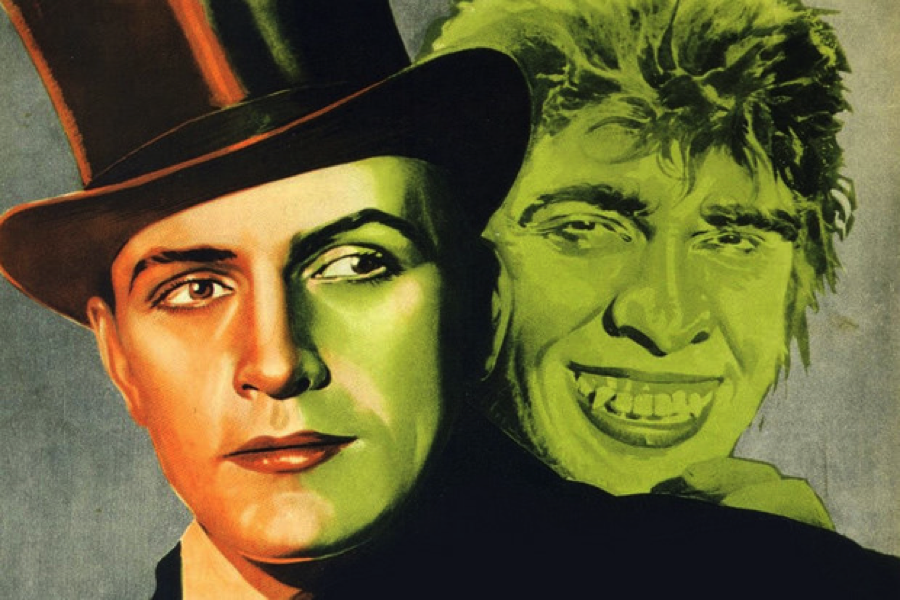
A new in-depth article has been added to the orgrad website.
Liberalism: the two-headed tyranny of wealth explores the way in which liberalism shares many of its ideological assumptions with fascism and how the two ideologies have gradually reconverged in the decades following the Second World War.
“Whenever economic liberalism finds itself under threat from ‘populism’, it quickly jettisons the principles of political liberalism to which it is theoretically tied.
“In other words, these ‘principles’ are not principles at all, just convenient postures designed to cloak the unpleasant reality of the economic liberals’ capitalist system.
“We might even define liberalism as being the deception maintained by capitalism to hide its true nature”.
Read the full article here.
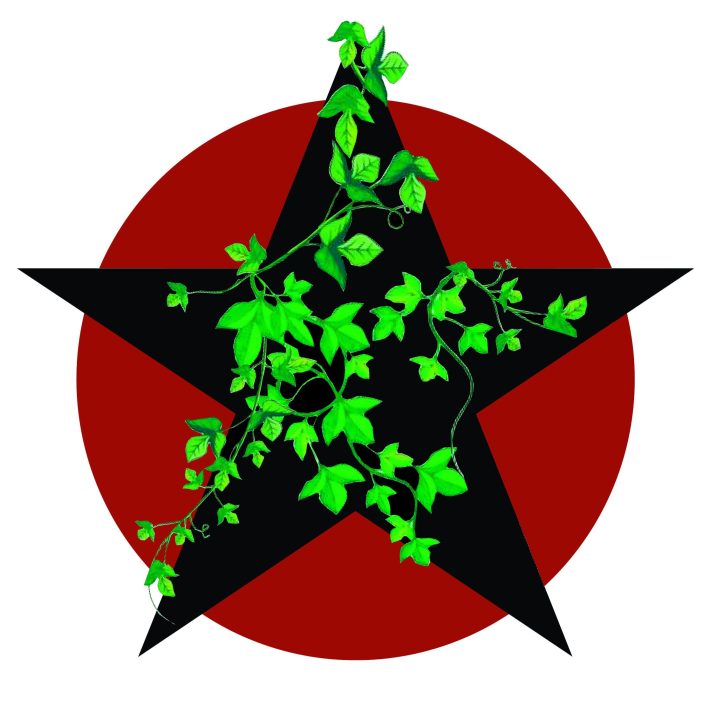
29 Friday Mar 2019
Posted in civilization, degrowth, Uncategorized
Tags
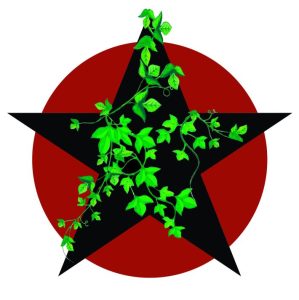
A new website has been launched which challenges “to the core” the thinking of the industrial capitalist system.
It presents the ideological alternative of an “organic radicalism” which it sources from a wide range of thinkers, past and present.
This philosophy, it says, is based on the idea of a living community, a social organism consisting of “horizontal relationships and exchanges between free human beings, rather than on sterile hierarchy”.
The site explains that it rejects the industrial capitalist view of nature as something to be exploited, commercialised, dominated or relegated to second place behind an imagined human priority.
“For us, humankind’s interests cannot be separated from the wider interests of the natural world, because we are nothing other than an extension of that world.
“We reject notions of economic growth or technological advance as any kind of worthwhile basis for society and propose instead a world founded on the healthy values of respect for nature and other creatures; simple but joyful living; an appreciation of inner and outer beauty; a sense of communal responsibility and belonging”.
In its Q&A section it defines the “orgrad” position as an evolution of anarchism.
But it adds: “From our perspective, contemporary anarchism does not go far enough in its opposition to industrial capitalism.
“In the same way as other leftists can become stuck within the broader capitalist mindset, merely seeking greater equality, individual freedom or self-management within the context of capitalism and the state, so do too many anarchists base their vision of the future on the industrial society created by and for capitalism.
“Orgrad also proposes a holistic world-view, based on organic belonging to community, species and nature, which is considered unacceptable by many contemporary anarchists, due to the influence of modern ideologies appropriate to capitalism.
“To be clear, orgrad has no interest at all in the dead-end narcissism of ultra-liberal identity politics”.
The site stresses that organic radicalism is firmly anti-fascist, defining it as “a left-wing, internationalist, humanist, universalist, anti-racist, anti-state, anti-imperialist, anti-militarist, anti-authoritarian ideology”.
The organic radicals website is at https://orgrad.wordpress.com
The email contact is orgrad(at)riseup.net
30 Wednesday Jan 2019
Posted in Uncategorized
≈ Comments Off on No Such Place as Asha – new 2019 novel from Paul Cudenec
Tags
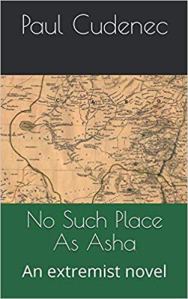
No Such Place as Asha: An Extremist Novel by Paul Cudenec has now been published and is available to buy online.
Beer-loving Brighton journalist Jon Harvey has been dragged out of semi-retirement by an old friend, who wants him to find his missing adult son, Henry.
Relying on his famous sense of intuition and some strange coincidences, Jon follows the trail from an eccentric left-wing library in Edinburgh, to an anti-capitalist convergence centre in London and then to an isolated corner of rural France.
The questions just don’t stop coming in this intriguing political detective story from Paul Cudenec, author of The Fakir of Florence and The Anarchist Revelation.
What is Henry up to? What is the significance of the books that seem to be guiding his movements? What is the precise agenda of the Kitson Institute of Democracy, for which Henry has been working?
And, most of all, what, who or where is Asha and why does it seem to lie at the centre of this whole entangled ideological intrigue?
25 Friday May 2018
Posted in anarchism, Uncategorized
Tags
Winter Oak author Paul Cudenec sets out where he’s at

https://network23.org/paulcudenec/2018/05/25/a-philosophy-fashioned-from-anarchism/
It’s now been five years since the publication of my first book, The Anarchist Revelation.
I have written a few more since then and have also used various articles, talks and interviews to explain my thinking. But I am still not sure that I have made myself completely clear, so this anniversary seems like a good time to try and put that right.
What is it that I am putting across in my writing? Why doesn’t it sound like what most other contemporary anarchists are saying? What political and philosophical position am I promoting, in a thousand-word nutshell?
The foundation of my personal philosophy is anarchism. That may seem obvious, but it’s worth spelling out. All the other elements that I am going to mention are contained within the context of my anarchism. While I certainly read non-anarchist authors, I only take on board their ideas if I find them compatible with my anarchist principles. There is no danger of my drifting away from anarchism, because my world view is fashioned from anarchism. The anarchist vision I present may not resemble other people’s personal versions of anarchism, but it remains anarchist.
These anarchist principles obviously include the rejection of all authority and control imposed from above, including the constructs of so-called law, so-called government, and so-called property, in favour of self-governing communities based on mutual aid. As an anarchist, I am necessarily internationalist and anti-racist, regarding every human being as of equal worth and with an equal right to share the earth and its fruits.
 Coupled with my anarchism is an opposition to industrial capitalism. I know that many anarchists broadly accept industrial society and envisage a future where industry and its infrastructure remain intact but under popular control. I don’t share that position and regard industrialism as a facet of capitalism and therefore something that is necessarily anathema to anarchists. I wouldn’t term myself a “primitivist”, but I certainly hope for an end to the nightmare of industrial society and for a future where people can live in harmony with the natural world, growing and producing according to the needs of the community rather than for the profits of an exploitative few.
Coupled with my anarchism is an opposition to industrial capitalism. I know that many anarchists broadly accept industrial society and envisage a future where industry and its infrastructure remain intact but under popular control. I don’t share that position and regard industrialism as a facet of capitalism and therefore something that is necessarily anathema to anarchists. I wouldn’t term myself a “primitivist”, but I certainly hope for an end to the nightmare of industrial society and for a future where people can live in harmony with the natural world, growing and producing according to the needs of the community rather than for the profits of an exploitative few.
Thirdly, and in conjunction with my opposition to industrial capitalism and the mass consumer society that it spawns, I advocate a future society based not on money, economic “growth” and technological “progress”, but on values. These values would be anarchist, of course – co-operation, equality and non-domination – but also, more broadly, involve the respect and appreciation of nature, beauty, quality, authenticity, simplicity, honesty, integrity and dignity.
Fourthly, I am seeking to piece together a philosophy founded on nature and on our belonging to nature. This seems to frighten some urban-minded anarchists, but was in fact very much what Kropotkin was working on, particularly in Ethics. By a philosophy of nature, I don’t just mean environmentalist politics, but an understanding of the human mind, and the human culture it has created, founded on the fact that we are one small part of a greater organic whole, usually called “nature”. Our innermost mental structures and tendencies reflect that belonging: it is the canvas on which our human culture is painted.

Fifthly, there is the metaphysical dimension. I have always been an atheist and have the instinctive aversion to the word “God” which is typical of anarchists. Instead, I follow Plotinus in regarding the entire universe as a living organism, as one indivisible entity. This is an extension of the concept of a living planet, Gaia. It is also an extension of the anarchist idea of a living, self-ruling, community, as opposed to a dead pseudo-community ruled over by a state. This idea of an organic universe, of which we are an instrinsic part, is deeply heretical, religiously and politically. It rejects the model of authority, of a separate God, and celebrates instead the magical and vibrant quality in everything: in every single person, animal, plant, river, stone, meteorite, galaxy. This is anarchist metaphysics! What could be more empowering, philosophically or politically, than realising that you are a temporary manifestation of a great organic whole, with all the freedom and responsibility this involves?
The sixth aspect of my philosophy is connected to the first five in a vertical, rather than horizontal, way. It is my awareness of the interconnections and correspondences between all the aspects I have outlined here. More than that, it is also the willingness to seek out connections and to understand their significance. It is a consciously holistic approach and, indeed, embraces holism as a political and philosophical value in itself.

The seventh facet is an awareness of all the ways in which the ideas and values I hold dear have been suppressed or sidelined in contemporary society. There is a historical angle to this awareness, and a cultural and political one. It applies to the various ideas separately and when taken together in various combinations. It also pertains to the links between them, which are often denied or overlooked, following the contemporary preference for classification, separation and fragmentation.
Element number eight of my philosophy perhaps goes without saying, bearing in mind the above – it is the intellectual desire to challenge and overcome the way important ideas and values have disappeared from our society. There is a difference between putting forward certain arguments which are rejected by society as a whole, and putting forward those same arguments together with an awareness and critique of the way they have been rejected. An intellectual suit of armour has been added. Analysing and countering the rejection becomes an intrinsic part of the political position because of the hostile intellectual environment.
The ninth element is a general belief in the need for action, for agency, for a dynamic dimension which takes us beyond passive reflection or analysis and allows us to engage with the world. It is movement, fluidity, risk, change, élan, resistance, revolt. This is already inherent in anarchism, of course, but it has to be expanded to take in all the other aspects as well, otherwise the overall philosophy becomes static.
Number ten is what I have been doing here. It is the act of being aware of all the above and consciously framing the whole thing as a political position.
Do you agree with me? Disagree? Have something to add? Please feel free to comment here or contact me via cudenec(at)riseup.net
20 Tuesday Jun 2017
Posted in Uncategorized
A new book by Paul Cudenec has been published by Winter Oak Press.
The Green One is a thoroughly researched and yet poetic book. The author explores how the awareness of our belonging to nature has always been present in human thought and culture. Today this vital spirit, which he personifies as The Green One, is inspiring global resistance to industrial capitalism.
I am The Green One, although I would maybe better be named The Green Many. Green is the colour of eternal youth, of rebirth, of nature springing back into life after the death-sleep of winter.
I am Pachamama, I am Isis, I am Yemoja. I am Jack in the Green, I am Tammuz, I am Khidr.
I am regeneration. I am the right way of living. Sometimes I am revolution.
I have taken up the mighty sledgehammers of the Luddites. The Virgins are escaping from the churches and heading for the woods. The May Queens are running riot in the streets. Joan of Arc is burning patriarchy at the stake.
The pylons are tumbling. The motorways are crumbling. The pipelines are fracturing.
I am your future.
The Green One is coming! The Green One is coming!
__________
The author explains more about his new book here and here.
The Green One can be purchased here.
The author is also offering pdf versions and books as part of his new crowdfunding initiative, which we urge readers to support.
On this page we are featuring a series of extracts, in pdf format, from The Green One.
EXTRACT 1 – When will the fields come back?
EXTRACT 2 – The living spirit of nature
EXTRACT 3 – Sacred trees
EXTRACT 4 – When we are we
EXTRACT 5 – The Silent Moving Folk
20 Monday Feb 2017
Posted in anarchism, Uncategorized

A sample chapter from Paul Cudenec’s book Nature, Essence and Anarchy, published by Winter Oak Press, is now available on the author’s blog.
“Denying reality” can be found at https://network23.org/paulcudenec/2017/02/20/denying-reality-a-dangerous-delusion/
21 Monday Nov 2016
Posted in anarchism, capitalism, civilization
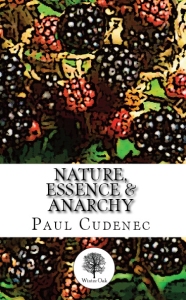
A thought-provoking new book has just been published by Winter Oak Press in the UK.
The starting point of Nature, Essence and Anarchy by Paul Cudenec is that very future of our species and of planetary life is at threat from the unchecked growth of the industrial capitalist cancer and that there is a need for a powerful and coherent resistance.
He argues that there has been a general thought-paralysis which renders any authentic and holistic anti-capitalist philosophy difficult to conceive and communicate. Our intellectual immune system has been disabled.
As a result of this, anarchist and anti-capitalist thinking has to look deeper than the surface of what is usually regarded as the political realm and root itself in an intellectual soil completely outside of capitalism and all its assumptions.
Natural anarchy
Beginning with Guy Debord’s condemnation of the world of artifice in which we live, the author describes how, in order to hide its own falsity, capitalism denies that humanity belongs to a holistic natural world and also denies the very possibility of authenticity. He discusses the way that, despite Peter Kropotkin’s work in describing the evolutionary importance of mutual aid and solidarity for all species, including humanity, many anarchists remain strangely suspicious of the idea of “nature”. Widespread misuse of the word, and the effects on our thinking of the industrial society surrounding us, make it difficult to reclaim the term and overcome our separation. He looks at the nature-based philosophy of the 16th century physician Paracelsus and suggest that we might rediscover authenticity by feeling within ourselves what he termed the Spiritus Mundi, the vital energy of the universe.
Denying reality: from nominalism to newthink
This essay explores the way in which contemporary society has a problem with objective reality. George Orwell warned about this in his novel 1984, in which the Big Brother state insists that everything exists only in the human mind. Cudenec argues that this fallacy dates back to medieval nominalism, when traditional “universals” were redefined as merely words describing human-invented categories. Postmodernists and postanarchists today extend this approach to deny the validity of concepts like essence, he says. Everything is said to be a construct. Subjective language is confused with objective reality. Anything outside industrial capitalist reality is denied legitimacy, trapping us within the dominant mindset.
When negative is positive
The anarchist desire to destroy capitalist society cannot be regarded as negative. For one thing, it aims to clear the way for a better world. But it also arises from a belief, as voiced by Rudolf Rocker and Noam Chomsky amongst others, that an anarchist society is always possible and that humans have the capacity to live harmoniously as a social organism. This capacity, which is innately present in the human mind but not always activated, reflects the overall tendency of the universe to take on a coherent structure. Conflict arises when the innate structures of the human mind meet an external world which does not allow them to fulfil their potential. As Otto Gross explains, some individuals give way and adapt to circumstances, while others rebel. A hatred of corrupt and unnatural society is founded on a positive vision of how things are meant to be.
Essence and empowerment
Modern life maintains us in a state of metaphysical sensory deprivation. If we wish to discover our core reality we need to look deep within ourselves. “Know Thyself” is a maxim dating back to at least Ancient Greek times and still central to contemporary paganism. The descent into the unconscious to find the Self, as invoked by anarchist Gustav Landauer for instance, is a reconnection to the organic universe described by Plato and Plotinus and also by the Sufi tradition. Understanding the individual as an aspect of a greater collective entity does not deny individual freedom, insists the author, but rather removes the limits imposed upon it by our separation and reveals an empowering and anarchic truth, always regarded as a dangerous heresy by authority.
Naturaphobia and the industrial-capitalist death cult
Humankind’s belonging to the living flesh of our planet is an essential reality of our innermost nature and will always resurface in our spirit. The industrial system finds ingenious ways of blocking and diverting our awareness of this. It claims that the “progress” of its technologies equates to an upward path for humanity. Some on the left have fallen into the trap of equating individual freedom with the artificiality of industrial capitalism and of thus condemning “naturalism” and “essentialism” as reactionary. Transhumanism is an extreme example of this trend. Its nature-hating naturaphobia and life-denying vitaphobia are combined with a denial of the polluting and destructive realities behind its sanitised industrial-capitalist image of the future.
The eye of the heart
Escaping the capitalist mindset is like digging a tunnel out of a prison camp. We need to go far enough and deep enough to go beyond its perimeter fences. Anarchists often fall short of understanding that industrial society is inherently capitalist and swallow the lie of “progress”. Mahatma Gandhi understood the need to oppose industrialism and rediscover simple village life, the natural harmony of Sanatan Dharma. Traditional culture has always been an obstacle to capitalism and has been systematically eradicated across the world. Cudenec joins E.F. Schumacher and Ranchor Prime in calling for humankind to draw on our ancient spiritual wisdom so we can deepen our opposition to capitalism. We must access the “eye of the heart” to better understand multi-faceted reality. We need a metaphysical dimension to our revolt to allow us to pass completely outside the concrete confines of modern industrialist dogma.
Necessary subjectivity
The well-known phrase “think globally, act locally” translates on a philosophical level as “think objectively, act subjectively”. If, like Plato and Plotinus, we define The Universe as all-inclusive, it necessarily includes abstracts as well as objects – numbers, dimensions, capacities and possibilities. We can never know the objective reality of this Universe, but we can know that this objective reality must exist and that it includes abstracts. Each of us has an abstract essence, which is a potential rather than a limit: the butterfly essence, for instance, exists even within a caterpillar which is eaten by a bird before this physical stage is realised. The specific realities of our subjective existence must always provisionally limit our core essence as aspects of The Universe, of which we should be metaphysically aware. But this limiting is also the only way in which The Universe can manifest itself in physical form. The same applies to time. We can only experience time through the necessary subjectivity of our living, just as a needle must follow the groove of a vinyl record. But the whole piece of music is always contained in the record, in the same way as all time must be contained within a Universe which contains everything. Our subjective presence-in-the-present means we do not just observe events unfolding, but participate in the process. We are part of the self-shaping of The Universe, with all the responsibility that this implies.
01 Tuesday Nov 2016
Posted in civilization, nature
Tags
NEW PUBLICATION FROM WINTER OAK
Modern Madness: A Wild Schizoanalysis of Mental Distress in the Spaces of Modernity
by Ed Lord
A radically ground-breaking investigation of mental distress in the spaces of the modern world has just been published by Winter Oak Press.
In Modern Madness: A Wild Schizoanalysis of Mental Distress in the Spaces of Modernity, talented new author Ed Lord opens up some fundamental questions for analysis.
What are we to make of an age that delivers pandemic levels of mental illness and a physical environment at the point of catastrophic collapse?
What is it that connects and infuses both modernity and psychiatry to make them seem like the only possible ways to organise our lives and aid our distress?
Could there be other options available? Other ways to explain and ameliorate our distress? What if mental distress is considered as much a matter of geography as it is of personal pathology?
The philosophical legacies of Felix Guattari and John Zerzan are employed to take the reader on a profoundly challenging walk through Critical Theory, anarchy and decolonisation to create a route to sanity via a wild-schizoanalysis.
Drawing upon a professional background in acute psychiatry and a personal immersion in radical environmentalism the author introduces us to the opening salvo of a wild and undomesticated way to think about the personal and global issues we face.
Website: winteroak.org.uk/books/modern-madness
Contact: winteroak@greenmail.net
Twitter: @modern_madness